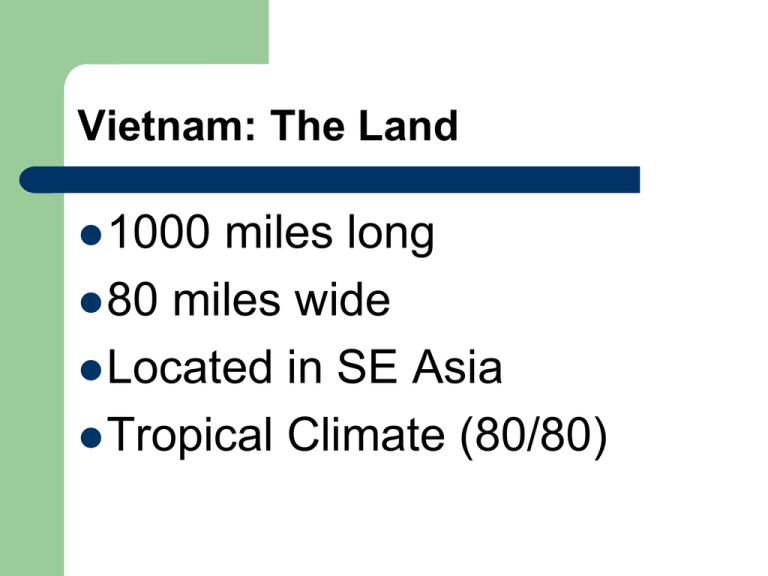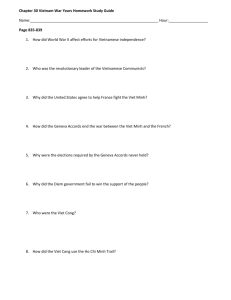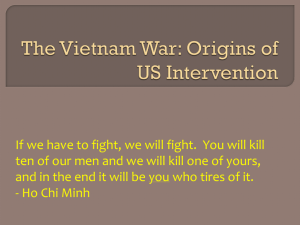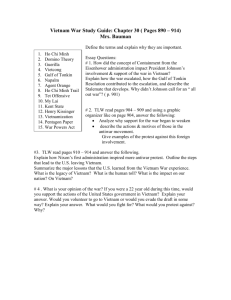Vietnam War Notes - Avon Community School Corporation
advertisement

Vietnam: The Land 1000 miles long 80 miles wide Located in SE Asia Tropical Climate (80/80) Vietnam: The Land Borders Laos and Cambodia Truong Mts. Western Border Subsistence Agriculture is #1 Economic Activity. Vietnam: The People Homogeneous Society Own distinct culture for over 2,000 years. Cities in the Red River Delta since before the birth of Christ. Long History of Conflict Vietnam was part of China for 1,000 years. Many rebellions and uprising required to get the Chinese out. Long History of Conflict 1884 France controls all of French-Indo China. French consider their colonization of Vietnam to be a Civilizing mission. Imperialism in Vietnam French occupation benefited Vietnam, and hindered it at the same time. French thrown out of Vietnam by the Japanese in WWII. Imperialism in Vietnam 1945 Japanese Surrender. French return to Vietnam. Viet Minh are fighting for Independence against the French. (80%) Viet Minh Led by Ho Chi Minh. Supported with money and weapons from China and USSR. US supports French. Domino Theory If Vietnam fell to the communists the rest of SE Asia would also fall to the Communists. US was committed to containment. Viet Minh Consider the war with France to be a war of Independence. French Defeated at Dien Bien Phu 1954. (12,000) The Geneva Accords 1954 Peace settlement between France and the Viet Minh. Ends the War. Divided the Country at the th 17 parallel. The Geneva Accords 1954 Free election to follow in 1956 to unite the entire country under one government. (selfdetermination) The Geneva Accords 1954 Provisional govt. set up in South Vietnam under Ngo Dinh Diem. North Vietnam is ruled by Ho Chi Minh. The Geneva Accords 1954 US influenced the Accords but did not sign them. Ho Chi Minh never accepted the division of the country. Ngo Dinh Diem Christian (catholic) Born in Vietnam Educated in the US Corrupt govt. Unpopular in Vietnam. Ho Chi Minh Wants Self determination for Vietnam. Rejected by US Turns to USSR. Communist tendencies Election 1956 Election does not take place. Ho Chi Minh would have won. Viet Cong start working to take over South Vietnam. Election 1956 Diem asks the US for help against the Communist forces. Aid, supplies, advisors are sent. (Eisenhower) Containment JFK is committed to fighting Communism. More money and advisors sent to Vietnam. 1960 – National Liberation Front Viet Cong = Vietnamese Communists. – Want the US out of Vietnam. War Fighting between North and South Vietnam from 19561964 with the US in an advisory capacity. (war is being lost) Gulf of Tonkin Incident US destroyers were attacked by Torpedo boats from North Vietnam in International waters.(12) Details are dubious. Gulf of Tonkin Resolution “take all necessary measures to protect US forces and prevent future Vietnamese aggression.” 416-0, 88-2. Gulf of Tonkin Resolution Works as a declaration of war. Expands the power of the President. Americanization of the War. Viet Cong = Defensive War Can obtain their goal without defeating the Americans. Viet Cong greatly overmatched. Viet Cong = Defensive War Strategy – “If we survive to fight another day they will get tired, and their own people will demand that the war be ended.” Tactics = Guerilla War VC impossible to distinguish. Civilians and militants look alike. No front lines. War of attrition. Napalm Jellied gasoline mixed with White Phosphorous and put into bombs. Dropped from the air. Agent Orange Herbicide/defoliant sprayed on the jungles to make it easier to spot VC from the air. Birth defects. Tour of Duty = Americans Amount of time spent in Vietnam. 365 days. Average age 19.5 years old. 3 million serve in Vietnam. American Advantages Better weapons. More supplies. More Structured leadership. Vietnamese Advantages Familiar with Geography. Soldiers more motivated. Defensive War. Culture/Language. Chinese/Soviet support. Support for the War Public support of the Vietnam war was strong from 1964-1968. Protest against the War 1966-67 A few congressmen begin to question the war. College Students and Professors begin to question the morality of the war. Protest against the War Berkeley Free Speech movement 1964. – First anti war demonstration. – U of C censored student protest of the war. Protest against the War US govt. assures the public that we are winning the war. That the VC are wearing down and progress is being made. Tet Offensive 1968 Tet = Vietnamese New Year. End of January A major offensive started by the VC, and Regular Army of North Vietnam. Tet Offensive 1968 VC show great strength and gain an early advantage. US military victory. The offensive was covered in depth on TV. Kent State May 4, 1970 Four college students shot and killed by the National Guard. (9 wounded) Protests greatly diminish. Jackson State Police and protesters clash. Two dead Eleven wounded. Credibility Gap The difference between what the govt. said was going on in Vietnam and what was really happening. Credibility Gap JFK RFK MLK These assassinations added to the gap. Credibility Gap People did not believe the govt. , and public support for the war greatly diminished. The Defensive strategy was working. Pentagon Papers Department of Defense Report leaked to the press by Daniel Ellsberg. Reported unethical practices by the govt. regarding Vietnam. Added to Credibility Gap. My Lai Massacre William Calley Jr. 400 plus killed. Women, children, old people. Shot down by rifle fire. Election of 1968 LBJ chooses not to run again. (unpopular) Richard Nixon – R- 43.4% Hubert Humphrey-D- 42.7% RFK assassinated Richard Nixon Campaigns on Law and Order Less Government Peace with Honor in Vietnam. Lottery System A new approach to the draft. Ended college deferments. Ended economics as an issue in the draft. Vietnamization US troops slowly being withdrawn. SV must take over the burden of the fighting again. Bombing of NV intensified. Vietnamization War is now being lost again. Last Americans leave in 1975. South Vietnam is overrun shortly after. War Powers Act 1973 Notify congress within 48 hours of sending in combat troops. Must end combat in 60 days unless congress permits more. Congress can over ride President with legislation. Robert McNamera Secretary of Defense for Kennedy and Johnson. Reflections on the war question our strategy and presence there. William Westmoreland US General in charge in Vietnam. Time Magazines man of the year 1968. Henry Kissinger Secretary of State, and National Security Advisor for Richard Nixon. Nobel Peace Prize 1973 for ending Vietnam War. Carlos Hathcock Marine Sniper in Vietnam. 93 confirmed kills. Longest one at over 2500 yards. Barry Sadler Medic for the Green Berets. Wrote the Ballad of the Green Berets. Pro war song.

![vietnam[1].](http://s2.studylib.net/store/data/005329784_1-42b2e9fc4f7c73463c31fd4de82c4fa3-300x300.png)





